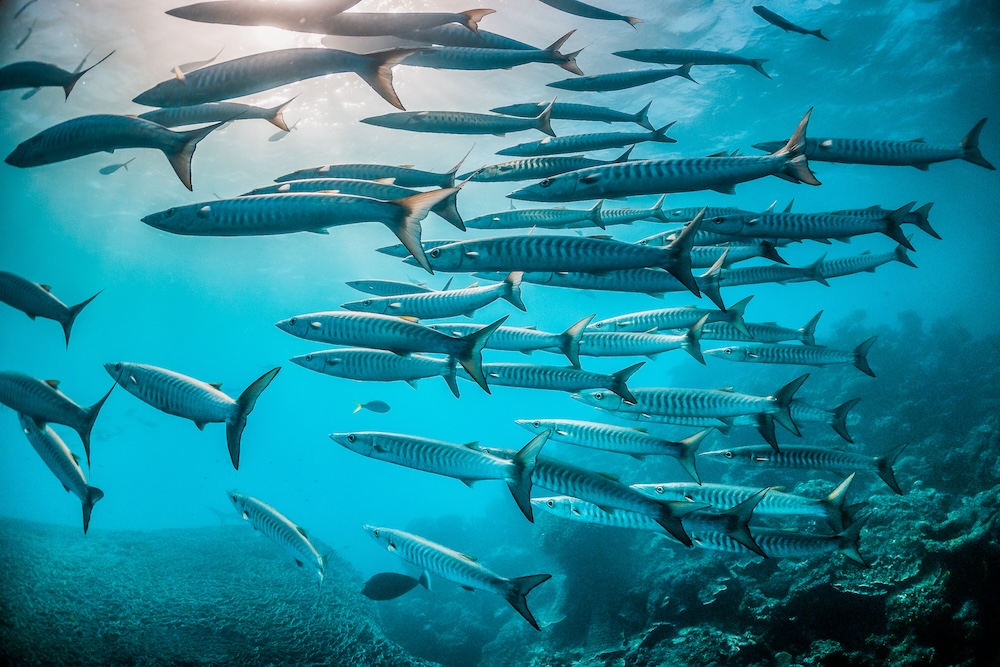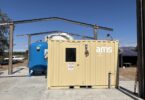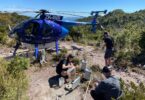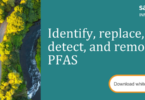Chris Gorell Barnes is someone who has always preferred action to idle words. As an entrepreneur and environmentalist, he believes in doing something that makes a real difference rather than talking endlessly while changing little.
After producing an award-winning movie highlighting the growing problem of overfishing, he has worked to set up marine protected areas, develop the blue economy, and hammer home the importance of the oceans to the environment, the economy, and even our society.
We welcomed the opportunity to speak with Chris about some of the problems facing the oceans but, more importantly, the ideas he has for solving them.
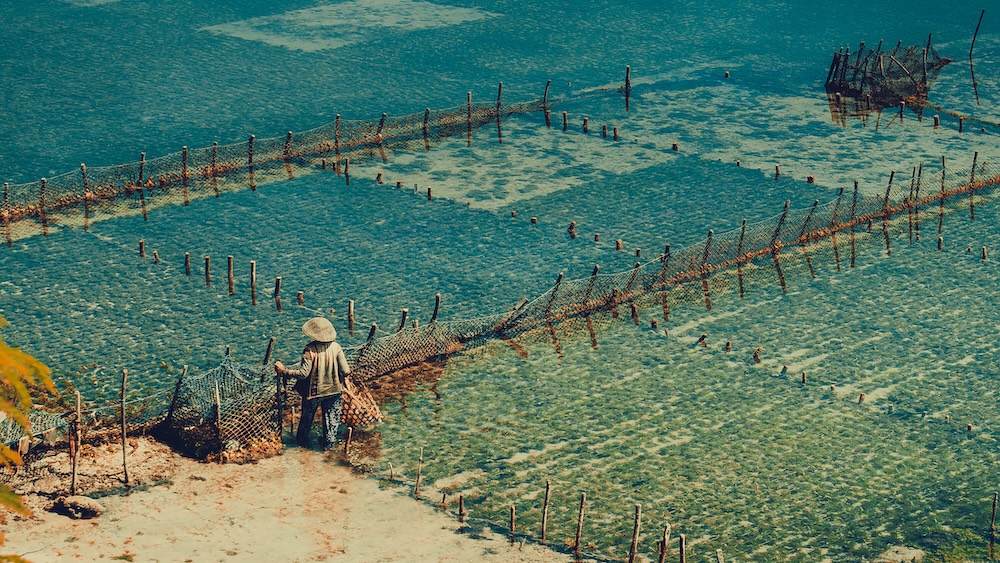
End of The Line
Many people in the fishing industry know the movie ‘End of the Line,’ but it went beyond that sector and impacted the public consciousness. It was one of the first documentaries to make people question where the fish they eat comes from. Hard-hitting and not afraid to show the reality, it shocked consumers into changing their eating and shopping habits, and taking more notice of fish stocks and overfishing.
“I’m an entrepreneur who worked in media and technology all my life, and a very keen fly fishermen, with a love of rivers and the ocean. I spend a lot of time in and on the ocean. It’s always been something that inspires me.”
“I became involved with a brilliant team that were making a movie called the End of the Line. This was about 15 years ago and it became a very successful documentary. I helped support the marketing and the outreach, making sure that that film was seen by as many people as possible. It made a significant impact on the understanding of overfishing and why we need to drive sustainable fishing initiatives and educate governments, consumers, and businesses.”
Marine Protected Areas and Blue Marine Foundation
Although End of the Line offered a powerful commentary on the damage caused by overfishing, once the publicity died down, losing momentum was always a danger. Without continued action, the documentary would slip from the public awareness and the message risked disappearing. Chris decided to build upon the publicity and find ways to tackle the issues raised in the film.
“On the back of the film, me and George Duffield, one of the producers, decided to launch a foundation to try and solve the problems that the film talked about. How do we create marine protected areas (MPAs) to preserve and restore the ocean and how can we use innovations to drive sustainable fishing and end overfishing?”
This process led to a new foundation with the remit of bringing innovation and the entrepreneurial spirit to ocean conservation:
“So, we set up the Blue Marine Foundation, an entrepreneurial, agile foundation. Not just another NGO, but something that was really going to drive conservation and also be quite cool and innovative. I’m a marketing man and felt that there was an opportunity to build something exciting.”
“If I fast forward today, 13 years on, Blue is now one of the largest most successful marine NGOs in the world. It’s managed to facilitate the funding, the creation, and the protection of marine protected areas that cover nearly 5 000 000 square kilometres of ocean.”
Setting up Marine Protected Areas is where Blue Marine has been particularly successful, with several areas already in place and many more under discussion.
‘We started our journey by helping the funding to create the largest MPA in the Indian Ocean. We’ve created MPAs in the Atlantic. We’re doing MPAs across the Mediterranean and Azerbaijan, in the Caribbean, the Grenadines, and the UK in Dorset and Scotland – all over the world.”
“Our incredible organization is not only creating and funding MPAs, but also being smart in terms of thinking about the wider problem with the oceans. How do we create new vehicles that actually are going to drive the necessary change?”
Spreading the Word
Importantly, Chris understands that Blue Marine Foundation needs a broad approach that raises awareness of the topic and builds support. The foundation also acquired funding and sought legal expertise to help challenge damaging policies and practices. Importantly, the organisation actively supports the development of new technologies.
“We have a blue carbon unit that’s leading the work in the science to really understand and unlock where blue carbon is sequestered. We have a media and a communications unit for communicating and really trying to drive the necessity for literacy and advocacy for the oceans.
We have an education unit that creates great content and education systems for schools and kids because we need to make sure that they really understand what’s going on in the ocean. We’re doing work with legal units where we’re using litigation to drive change, such as how could we ban bottom trawling, for example, using the rule of law?”
All of this has helped the foundation grow and start achieving its aims, becoming an organisation with genuine influence and the ability to bring about positive change.
“So, Blue’s been incredibly successful. We’ve got fantastic funders, an amazing team of committed individuals who really are driving such a significant positive impact on the ocean. And then more recently, we advised on the launch of an impact fund.”
While Blue Marine achieved far more than intended, it could only go so far and the next step involved using capital to bring about change.
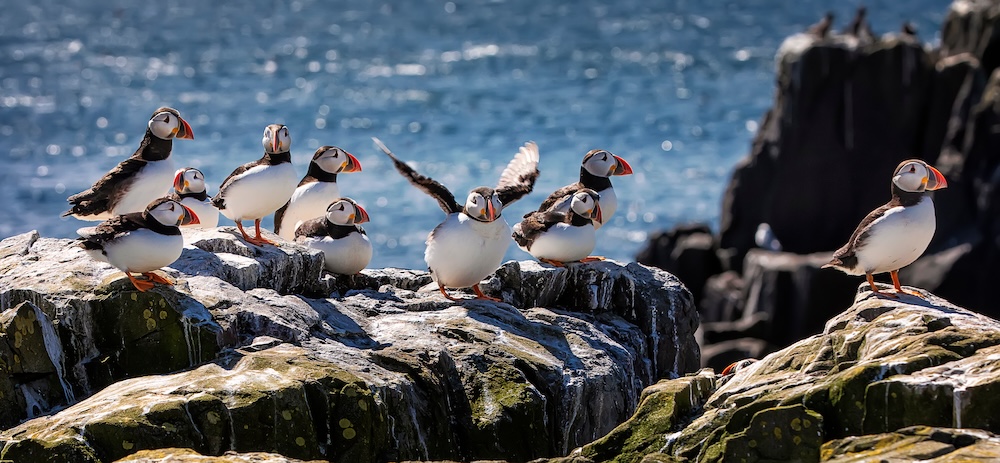
Ocean Capital
As an entrepreneur, Chris understood that NGOs are an important part of protecting the oceans, but they are only one part of a strategy. Within the economic system we have, unlocking capital and attracting investment opens up more options for shifting the focus towards marine preservation.
“It was clear to me that philanthropy is hugely important, but actually plays only one role in what we need to do to conserve and protect and regenerate the ocean. What’s fundamental is that we get enough vehicles to drive the capital to transform so that we really do have a sustainable and regenerative blue economy. So, the Ocean 14 Capital fund was launched about two years ago.”
“That is now a hundred and fifty million Euro impact fund investing throughout the blue economy driving change and building impact for businesses across aquaculture, fisheries, plastics, and seaweed.”
Naturally, capital requires investment opportunities and showing investors where and how they can make returns. Part of this involves showing the true value of oceans and where sustainable investment can succeed and lead to solutions that balance economy and finance with environmental aims.
“That’s an incredibly exciting journey where I think the blue economy is becoming the most important investment of our time. It’s attracting a lot of attention, and a lot of capital is now looking at this, realizing that not only is the ocean equivalent to the seventh largest country’s GDP. It’s a massive opportunity to deliver good returns, but also deliver a hugely positive impact for the ocean and therefore the environment.”
The importance of Oceans
Another important focus of protecting the marine environment is pressure from the public, who can influence politicians through the ballot box but also through where they spend their money.
“I think we’re certainly seeing demand for change from – I don’t like calling them consumers because I think it’s sort of makes them feel like aliens – but let’s call them citizens. If you think about people as citizens, then you’re talking to them as if they actually do care about the planet as opposed to just ones who consume stuff.”
“There is definitely a tidal shift in wanting to have better sustainable products, whether that’s packaging, products you eat and whether that’s sustainable fish or vegan products or organic products. There’s definitely a change in in demand and realization that the planet really is in trouble.”
Out of Sight, Out of Mind
Although there is now more awareness of what foods we eat and where it comes from, and demand for environmentally less-damaging products, the oceans are too often passed over. While preserving rainforests and other sensitive ecosystems is crucial for the environment and human society, the oceans often received much less attention.
“There still needs to be more understanding of the role the ocean plays in regulating the entire planet. I think it’s getting better. I mean, it’s taken too long for the ocean to be at the top table. It’s only two COPs ago that the ocean actually got a space and the fact that, in 2015, they nearly published the sustainable development goals without one for the ocean.”
“I mean how is that even possible to think about that, right? When you look at it and it’s definitely the most important one that needs actually funding and protecting because it connects all the other ones.”
Chris notes that this made it much harder to generate funding and support partly because the ocean is often less accessible and much of what goes on is unseen and below the surface.
“That’s been the problem with conservation as out of sight, out of mind. When we started Blue Marine 13 years ago, it was impossible to get any money out of anybody because it was, ‘The ocean: What do you mean?’”
Generating support meant looking to people who understand the ocean and have the ability and means to influence people in positions of power. This slowly builds pressure for recognition of the challenges faced by the marine environment and creates a base of support.
“We really targeted and focused on yacht owners who have a care and a passion for the ocean. But now, in 2023, you’ve got big corporates, insurance companies, banks, businesses all finally realizing they understand the science. They understand why the ocean is important. They see the carbon potential. They see the food security issue.”
“The money is starting to come in and, hopefully, with successes like the High Seas Treaty, and the drive for countries to have 30 percent of their water protected, maybe we can we can reverse the tide. I hope so.”
How do we Change?
While finding funding and support for the oceans is the first stage and can encourage change, it means little without policies and approaches. These must be well thought out, supported by science, and start placing value not just on the ocean itself but the people and communities that depend upon it. As Chris is keen to point out, part of this is enforcing the policies we already have:
“I think, number one, I’d like to see all of subsidies for IOU fishing stopped. I mean, that’s just insanity. You’re paying whether it’s fuel or other subsidies, for vessels that are actually stealing fish from other people and you have very bad practices in fishing. Stop subsidies that are going to IOU fishing. Let’s make sure that policy is driving and sticking to the promise of 30 percent MPAs and these aren’t just paper plans. They’re properly protected. Let’s get the high seas treaty over the line and let’s make sure it is initiated.”
Another area of contention with fishing policies around the world is the exploitation of fisheries in poorer countries by large, industrial scale operations that seek to acquire licenses cheaply, fish illegally, and often use very destructive techniques.
“I think that a lot of the issues are with the illegal unregulated and reported fishing that is taking the fish from those poorer countries. Countries that are sticking to the sustainable limits and fishing where they’re supposed to, let them carry on doing the right thing. It’s enabling the countries to be able to enforce their MPAs. It’s all very well and good declaring one, but let’s enforce it and make sure it’s secure and does its job.”
“But I think it’s really stopping the bad guys. There’s a lot of fisher people that are very good, artisanal small-scale fisherman, whether we have them in Greece or the UK or all over the world. These are the good guys, most of them. It’s these big industrial battleships that need to be controlled. Why are fish aggregation devices still allowed? Why are systems like dredging enabled that are destroying the seabed?”
Answering these questions requires a much more proactive approach from regulators and authorities to create better laws and also enforce them.
“Let’s make fishing a much more sustainable, precise, fair, and controlled practice. That requires huge amounts of regulation, rule of law, and systems. For example, how can port authorities all sign up to stopping anything illegal being landed, or how can we use technology for transparency of all fish stocks?” “Let’s make sure policy can stop deep sea mining.”
Putting a Price on Nature
Under the traditional economic models, nature, including the oceans, is often evaluated only by the resources it provides. Chris wants to take a much wider view and put a value on the environment and biodiversity. Finding ways to assess protection and restoration could be the key to the marine environment and a cornerstone of the blue economy.
“Let’s create the right regulatory frameworks that actually put a value on nature and biodiversity in the ocean because we do live in a capitalist world and you know nature at the moment does have value. Let’s put a value on it and then we’ll protect it and restore it, and save it as opposed to destroying it. I think those are very important things that we could do.”
“We need to have nature-based accounting because nature is our best technology. It’s the best asset that we’ve got. It’s the most powerful. It’s the only thing that’s going to possibly take all of carbon out the atmosphere.”
Doing this can also ensure that the benefits are spread much more fairly across the global community rather than drawing natural wealth away from the societies most affected. Placing a value on nature can bring a different approach that moves from exploitation to partnerships.
“We need to put a value on it, and then countries that have most of the nature – the ones with the poorest balance sheets – actually can benefit and, therefore, everybody benefits. Let’s speed that up. We don’t have much time. We’re not going to be able to change the entire system. Working with this system that we have, and creating a sort of beneficial way of managing and protecting nature through financial markets, I think, is the solution.”
“In the sea shelf, in the seafloor where 80 percent of the carbon in the ocean is, in fact, sequestered. How can we use that to unlock conservation benefit. Imagine if actually you could monetize an MPA through the amount of carbon that was sequestered.”
As a final note, Chris points out the importance of the oceans for global food security and how sustainable fishing and aquaculture can feed vast swathes of the planet’s population. Out of all his work, perhaps this is the most important.
“The last thing I’d say is from a food security perspective. We have to invest in blue foods and make sure that it’s sustainable and regenerative because, if we’re going to feed the world, the most environmentally efficient form of protein is sustainable aquaculture done well. The big issues with food systems destroying the world coming mostly from land and, if we can make aquaculture sustainable and regenerative, we have a way of ensuring food security and not messing up the planet.”
Between philanthropy through Blue Marine Foundation, setting up MPAs and putting the oceans and sustainability at the forefront, as well as redefining the importance of oceans and placing a proper value on them, perhaps we can start to move forward with sustainable solutions and ensure that everyone wins.
Find out more at: Ocean14 Capital and Blue Marine Foundation
Related articles:
Company Fined $1.5M Harms to Natural Resources and Cold Water Fishery in Massachusetts



